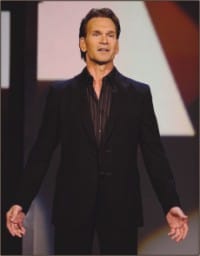Patrick Swayze (1952-2009): The ultimate romantic lead

Actor Patrick Swayze whose 20-month battle with advanced pancreatic cancer drew wide attention, died Monday. He was 57.
His publicist confirmed that Swayze died peacefully with family at his side.
Patrick Swayze did action movies and historical drama. But he will be best remembered for being the leading man in two enormously popular romantic fantasies: one where he was the first-love fantasy, and one where he was the perfect-martyr fantasy.
His huge success as a romantic hero came after an early flirtation with pure Brat Pack success: his first major exposure came in “The Outsiders,” followed by “Red Dawn” and “Youngblood”.
Then, in 1985, in the first sign of what was to come, he played a gallant, romantic southerner in the miniseries “North And South.” It set the table for the very big year he was about to have.
And the reason he moved up from supporting player to giant star really comes from his ability to convincingly play down his powerfully athletic physicality and be, for lack of a better phrase, a little soft. Swayze was good-looking, of course, he had a dancer's body and not just one built strictly in the gym. But he wasn't quite as delicately pretty as a lot of similarly positioned stars. Eyes maybe a tiny bit too small, kind of a square head...
At the time Swayze made “Dirty Dancing” in 1987, the model for crush-worthy young actors was Tom Cruise -- after all, “Dirty Dancing” came out the year after “Top Gun.” But Swayze didn't quite have Cruise's toothy, ingratiating brand of smoothness. His presence was a little quieter and it was much, much more vulnerable.
That's what made him the perfect guy for a coming of age story like “Dirty Dancing.” A lot of actors would have seemed sort of creepy in the role of Johnny Castle, who's a little older and more experienced than Baby.
But instead of appearing in any way predatory, Swayze came off as lonely and a little sad -- the perfect adolescent image of the apparently dangerous bad boy who really does have a heart of gold.
There's a reason “Nobody puts Baby in a corner” became an iconic line: it combines someone loving you, someone insisting upon your freedom, and someone defending you from your parents -- what could be dreamier?
He navigated some potentially tough waters in “Ghost,” too: playing a literal avenging angel is not for amateurs. The schlock in that movie is cranked up to at least 10, and that's just in the first act. The music, the potter's wheel, the big emoting -- by the time he's vanishing in a field of little gobs of white light, the movie has hit a level of earnestness that's almost impossible to maintain. The only way through that kind of story is to commit, and that's how Swayze made that movie work. Maybe not for taking seriously, but for enjoying, as many people did.
Once again, “Ghost” is a fantasy -- about the guy who loves you so much he would defy the limitations of mortality to keep you from getting hurt. It's a different kind of ideal, but it's an ideal nonetheless. In the end, it added up to $217 million -- a remarkable and rarely repeated box-office haul for a romantic melodrama.
There's also some nice comedic back-and-forth with Whoopi Goldberg in that movie -- showing a game willingness to play around that he repeated in “To Wong Foo, Thanks For Everything, Julie Newmar.”
Swayze had done many movies but the ones people are still going to be watching, even many years from now, are those two lovely romantic fantasies, perfectly executed.
Compiled by Cultural Correspondent

 For all latest news, follow The Daily Star's Google News channel.
For all latest news, follow The Daily Star's Google News channel. 



Comments